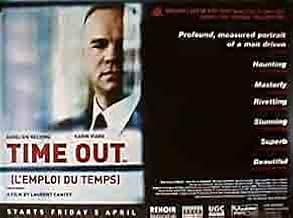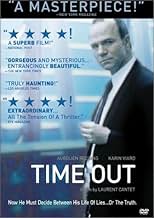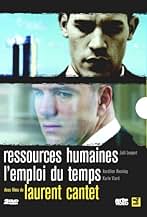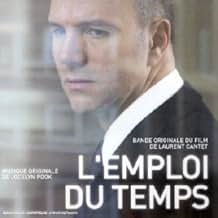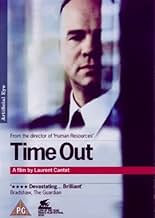IMDb RATING
7.3/10
5.1K
YOUR RATING
An unemployed man finds his life sinking more and more into trouble as he hides his situation from his family and friends.An unemployed man finds his life sinking more and more into trouble as he hides his situation from his family and friends.An unemployed man finds his life sinking more and more into trouble as he hides his situation from his family and friends.
- Awards
- 3 wins & 8 nominations
- Director
- Writers
- All cast & crew
- Production, box office & more at IMDbPro
Storyline
Did you know
- TriviaInspired by a true story, that of Jean-Claude Romand. In reality, Romand went on to kill, on January 9, 1993, his wife, two children and both his parents. It is the first of three films in two years inspired by the case, followed by The Adversary (2002) and La vida de nadie (2002), of which the former is the closest to the real events. Phantom (2002) was also inspired by the same incident.
- ConnectionsFeatured in The 2003 IFP Independent Spirit Awards (2003)
- SoundtracksL'Emploi Du Temps - Musique Originale
Composed by/ Arranged By Jocelyn Pook
Performed by 'Electra Strings' Ensemble
Cello Solo performed by Sophie Harris
Viola Solo performed by Clive Howard
Violin solo performed by Jacqueline Norrie
Phonographic Copyright (p) Jocelyn Pook / Haut et Court
Under Exclusive License To Virgin France
Published By Chester Music Ltd.
© 2001 Virgin France
Featured review
There is a telling moment toward the end of the new French film L'Emploi Du temps (Time Out) when the main protagonist confides to another character that he hated his previous job so much that many times while driving to a designated business appointment he would intentionally miss the appropriate exit and continue driving aimlessly , not wanting to leave his car. This behavior eventually results in his dismissal , a fact he hides from his family.
A white collar worker who has lost enthusiasm for his job , Vincent spends each "work day" sitting in public parks and eateries fabricating imaginary business meetings and appointments , talking to his wife on a cell phone and promising her that he will be home soon ; for supposed longer trips he sleeps in his car at night , interrupted at times by parking lot security who gruffly tell him to leave, What follows is a devastating tale of lies and more lies , of eroding relationships with wife , children , parents and friends. Vincent finds himself in a nether world and this film's director , Laurent Cantet , brings a chillingly cold but compassionate eye to the proceedings. Curtly refusing help from a former friend and business associate who is aware of his predicament , Vincent becomes enmeshed in a labyrinth of deceitful money making schemes. If all this seems like so much high melodrama , be assured that Mr. Cantet has painted as naturalistic a portrait of one man's modern day angst as has been seen on the screen in many a moon. Here is a filmmaker who possesses a keen eye for ordinary , everyday life. What distinguishes this magnificent film from most contemporary releases is its total lack of artifice. Each sequence in this riveting movie is so spontaneous that it convinces the viewer that what is happening is real. Much of the credit for this must go to Aurelien Recoing as Vincent. A handsome French actor , he portrays a likable fellow encroaching middle age who has lost his way ; as the film progresses , his sturdy frame becomes weighed down as much from literally running away from home and responsibilities as running from himself. Equally impressive is Karin Viard as Vincent's loving but exasperated wife. The movie also benefits immeasurably from the director's penchant for casting on professionals in supporting roles , no better an example than the presence of Serge Livrozet as a petty crook , a character who serves as an important catalyst for the film's gripping denouement. Mr. Livrozet , who acts with the authority of a seasoned professional and turns in a brilliant performance , is in real life an ex-convict who apparently lived the life he portrays on screen. This adds a verisimilitude that makes watching this movie such a sobering experience. As spontaneous as this picture feels , it doesn't lack for a meticulous production design. Elegant camera work , carefully appropriated sets ( the interiors of the Geneva office building Vincent wanders through look as though they were photographed and designed by Stanley Kubrick ) add to the chilly atmosphere. Jocelyn Pook's melancholy chamber music seems suffocatingly oppressive at first but achieves an overwhelming resonance at the story's climax. One man's isolation may not seem like an earth shaking subject for a movie.
Playwrights from Becket to Genet to Miller have traversed this area very eloquently in the past. But Laurent Cantet has fashioned a modern day morality tale that very quietly and methodically builds to a fever pitch of anger , loss and sorrow. The final scene of this film is devastating ; it will fill you with contradictory emotions. It is one of the great endings in movies. L'Emploi Du temps is a giant of a film , a masterpiece for our time.
A white collar worker who has lost enthusiasm for his job , Vincent spends each "work day" sitting in public parks and eateries fabricating imaginary business meetings and appointments , talking to his wife on a cell phone and promising her that he will be home soon ; for supposed longer trips he sleeps in his car at night , interrupted at times by parking lot security who gruffly tell him to leave, What follows is a devastating tale of lies and more lies , of eroding relationships with wife , children , parents and friends. Vincent finds himself in a nether world and this film's director , Laurent Cantet , brings a chillingly cold but compassionate eye to the proceedings. Curtly refusing help from a former friend and business associate who is aware of his predicament , Vincent becomes enmeshed in a labyrinth of deceitful money making schemes. If all this seems like so much high melodrama , be assured that Mr. Cantet has painted as naturalistic a portrait of one man's modern day angst as has been seen on the screen in many a moon. Here is a filmmaker who possesses a keen eye for ordinary , everyday life. What distinguishes this magnificent film from most contemporary releases is its total lack of artifice. Each sequence in this riveting movie is so spontaneous that it convinces the viewer that what is happening is real. Much of the credit for this must go to Aurelien Recoing as Vincent. A handsome French actor , he portrays a likable fellow encroaching middle age who has lost his way ; as the film progresses , his sturdy frame becomes weighed down as much from literally running away from home and responsibilities as running from himself. Equally impressive is Karin Viard as Vincent's loving but exasperated wife. The movie also benefits immeasurably from the director's penchant for casting on professionals in supporting roles , no better an example than the presence of Serge Livrozet as a petty crook , a character who serves as an important catalyst for the film's gripping denouement. Mr. Livrozet , who acts with the authority of a seasoned professional and turns in a brilliant performance , is in real life an ex-convict who apparently lived the life he portrays on screen. This adds a verisimilitude that makes watching this movie such a sobering experience. As spontaneous as this picture feels , it doesn't lack for a meticulous production design. Elegant camera work , carefully appropriated sets ( the interiors of the Geneva office building Vincent wanders through look as though they were photographed and designed by Stanley Kubrick ) add to the chilly atmosphere. Jocelyn Pook's melancholy chamber music seems suffocatingly oppressive at first but achieves an overwhelming resonance at the story's climax. One man's isolation may not seem like an earth shaking subject for a movie.
Playwrights from Becket to Genet to Miller have traversed this area very eloquently in the past. But Laurent Cantet has fashioned a modern day morality tale that very quietly and methodically builds to a fever pitch of anger , loss and sorrow. The final scene of this film is devastating ; it will fill you with contradictory emotions. It is one of the great endings in movies. L'Emploi Du temps is a giant of a film , a masterpiece for our time.
- mpofarrell
- Aug 16, 2002
- Permalink
- How long is Time Out?Powered by Alexa
Details
- Release date
- Country of origin
- Official sites
- Language
- Also known as
- El empleo del tiempo
- Filming locations
- Production companies
- See more company credits at IMDbPro
Box office
- Gross US & Canada
- $448,542
- Gross worldwide
- $1,213,913
- Runtime2 hours 14 minutes
- Color
- Sound mix
- Aspect ratio
- 1.85 : 1
Contribute to this page
Suggest an edit or add missing content





